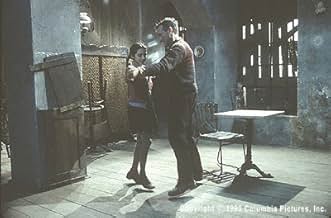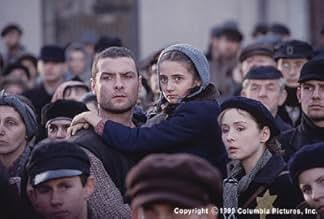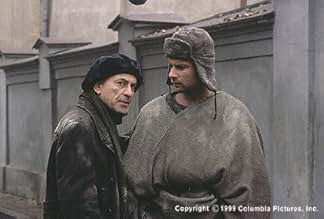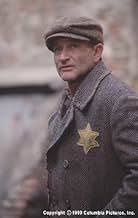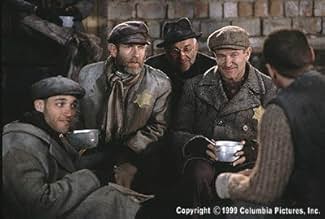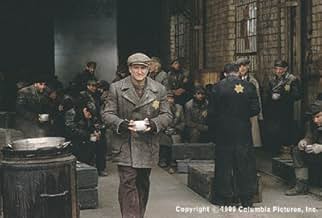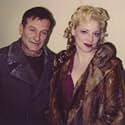IMDb-BEWERTUNG
6,5/10
18.476
IHRE BEWERTUNG
Ein gewöhnlicher Bewohner eines Ghettos fälscht während Des zweiten Weltkriegs Nachrichten Über Alliierte offensiven, um andere Opfer des NS-Regimes zu wecken.Ein gewöhnlicher Bewohner eines Ghettos fälscht während Des zweiten Weltkriegs Nachrichten Über Alliierte offensiven, um andere Opfer des NS-Regimes zu wecken.Ein gewöhnlicher Bewohner eines Ghettos fälscht während Des zweiten Weltkriegs Nachrichten Über Alliierte offensiven, um andere Opfer des NS-Regimes zu wecken.
- Regie
- Drehbuch
- Hauptbesetzung
- Auszeichnungen
- 2 Gewinne & 3 Nominierungen insgesamt
Éva Igó
- Lina's Mother
- (as Eva Igo)
István Bálint
- Lina's Father
- (as Istvan Balint)
János Gosztonyi
- Samuel
- (as Janos Gosztonyi)
Ádám Rajhona
- The Whistler
- (as Adam Rajhona)
Péter Rudolf
- Roman
- (as Peter Rudolf)
Empfohlene Bewertungen
I won't repeat the plot as many other comments have taken care of that. Many of Robin Williams' performances have been Robin Williams playing a character -- there's a wink and a hint that he'll bust out with some shtick at any time. He (or the director, or both) contain that impulse to an impressive degree in this movie and do so without the excessive sincerity that Williams often substitutes for emotion in his other parts. (Good Will Hunting contains an overrated performance of this type.) Example: in the scene where he takes on the voices of Churchill, Stalin, and others, it's wholly within his character's desire to persuade the little girl (who's wonderfully played, by the way) that hope remains. I agree that some of the actors, notably Alan Arkin, aren't very good, but other, less-well-known ones support the movie well. In addition, I thought the production design, cinematography, and editing were thoughtful and well-done. And I liked the ending...
Over the years, I have found Robin Williams to be one of the most frustrating actors around. Clearly loaded with talent, in my opinion at least most of his movies have been disappointments. He either gives unnecessarily over-the-top performances that really don't fit the context, or he controls his natural comedic instincts to the point at which he comes across as uninspired. So I wasn't sure what to expect in "Jakob the Liar." What I found was a surprisingly good performance in a wonderful movie.
Williams plays Jakob Heym, confined to the Jewish Ghetto of Warsaw by the Nazis during the Second World War. With hope fading, Heym accidentally discovers that Russian troops aren't far away, and begins to spread the news. Others become convinced that he has a radio hidden, and Heym's fictional "news reports" from the BBC provide enough hope to keep the residents of the Ghetto going through this dark time.
Williams (also executive producer) did a fine job as Heym. As one would expect, his character comes across as something of a comedian ("I believe we're God's Chosen People; I just wish He had chosen someone else!") but his humour is appropriate; the sort of dark humour one would expect from people in this situation. The other performances faded into the background, not because they were bad but because Williams so dominated the movie. Special mention should go to Justus von Dohnanyi, though, who played the Nazi Commandant "Preuss." Dohnanyi manages to capture exactly the sort of slimy, inhuman character one would expect to be put in charge of such a business. The rest of the cast (primarily Hannah Taylor-Gordon as Lina and Liev Schreiber as Mischa) are good, but overshadowed by Williams.
The character of Kirschbaum (played by Armin Mueller-Stahl) filled me with sadness and represents a clear statement of the evils of Nazism. A world-famous cardiologist, Kirschbaum, because he is Jewish, is forbidden to practice medicine, and ends up cleaning toilets. Mueller-Stahl plays the character with a quiet dignity, and next to Williams is the clear highlight of the movie.
This movie represents a wonderful testimony to the importance of hope in helping people see themselves through what must seem to be impossible situations. Although fictional, it is an important movie for those with an interest in the events of this era.
7/10
Williams plays Jakob Heym, confined to the Jewish Ghetto of Warsaw by the Nazis during the Second World War. With hope fading, Heym accidentally discovers that Russian troops aren't far away, and begins to spread the news. Others become convinced that he has a radio hidden, and Heym's fictional "news reports" from the BBC provide enough hope to keep the residents of the Ghetto going through this dark time.
Williams (also executive producer) did a fine job as Heym. As one would expect, his character comes across as something of a comedian ("I believe we're God's Chosen People; I just wish He had chosen someone else!") but his humour is appropriate; the sort of dark humour one would expect from people in this situation. The other performances faded into the background, not because they were bad but because Williams so dominated the movie. Special mention should go to Justus von Dohnanyi, though, who played the Nazi Commandant "Preuss." Dohnanyi manages to capture exactly the sort of slimy, inhuman character one would expect to be put in charge of such a business. The rest of the cast (primarily Hannah Taylor-Gordon as Lina and Liev Schreiber as Mischa) are good, but overshadowed by Williams.
The character of Kirschbaum (played by Armin Mueller-Stahl) filled me with sadness and represents a clear statement of the evils of Nazism. A world-famous cardiologist, Kirschbaum, because he is Jewish, is forbidden to practice medicine, and ends up cleaning toilets. Mueller-Stahl plays the character with a quiet dignity, and next to Williams is the clear highlight of the movie.
This movie represents a wonderful testimony to the importance of hope in helping people see themselves through what must seem to be impossible situations. Although fictional, it is an important movie for those with an interest in the events of this era.
7/10
What I like about Jakob's tale is that Jakob is no natural hero who sets out to keep hope alive. Far from it. He is an ordinary man, and as terrified of the Nazis as any of his neighbors in the ghetto. He blunders his way into his unlikely role as a keeper of hope, and once there, cannot see from moment to moment how he can maintain it, wishes at times he could be rid of the burden, and yet somehow, manages to continue to inspire others who are so desperate for hope, they don't even try to disbelieve. In short, don't be fooled by the title: Jakob is just this guy; plotwise, he is only a hub around which a large wheel turns.
There were parts that didn't work for me, especially pieces where narration would have worked better than a character monologue (Jakob is a narrator as well as a character, so why does he talk to himself instead of us so much?) But on the whole, it was a good story, well performed by those involved.
The ending, which I shall refrain from describing for the benefit of any who have not seen it, is absolutely fitting. It is surreal, which may bother some, but leaves the door open to so many interpretations that you will wonder whether to take it as the true end, or whether it was Jakob's final lie. And fittingly, the decision is left in the mind of the viewer.
There were parts that didn't work for me, especially pieces where narration would have worked better than a character monologue (Jakob is a narrator as well as a character, so why does he talk to himself instead of us so much?) But on the whole, it was a good story, well performed by those involved.
The ending, which I shall refrain from describing for the benefit of any who have not seen it, is absolutely fitting. It is surreal, which may bother some, but leaves the door open to so many interpretations that you will wonder whether to take it as the true end, or whether it was Jakob's final lie. And fittingly, the decision is left in the mind of the viewer.
Perhaps best described as Good Morning Vietnam meets Schindler's List. Robin Williams plays Jakob, a Jewish prisoner in WW2 Germany who hears some news about the approaching Russian army, and lets it slip to his friend Mischa who believes Jakob has a radio to have gotten this news. Rumors then spread throughout the Jewish ghetto and soon everyone believes he has a radio, so he decides to make up news in order to give them some sense of hope in this holocaust. It's important to note that Williams is NOT trying to be funny in this film, which is appropriate considering the setting. Well written and produced with noteworthy performances
10Weebette
Maybe the reason I keep hearing so many negative comments on this film is because people aren't seeing it for what it is. It is not a comedy by any stretch of the imagination. It is not an attempt to profit from LA VITA E BELLA (this was filmed in the autumn of '97, before the Benigni film was even released in Italy).
The truth is, JAKOB THE LIAR is an incredible film in its own right. I've read/seen many other Holocaust testimonials (including MAUS and the aforementioned LA VITA E BELLA), but this was by far the most stirring of any of them. I was especially impressed by Robin Williams' performance. Granted, I'm partial to him, but I was completely bowled over by this performance. I believe this is the darkest and most serious role he has ever done, but he pulls it off magnificently.
Don't believe the nay-sayers on this one ... this is incredible. It's a must-see for everyone. Would I lie to you?
The truth is, JAKOB THE LIAR is an incredible film in its own right. I've read/seen many other Holocaust testimonials (including MAUS and the aforementioned LA VITA E BELLA), but this was by far the most stirring of any of them. I was especially impressed by Robin Williams' performance. Granted, I'm partial to him, but I was completely bowled over by this performance. I believe this is the darkest and most serious role he has ever done, but he pulls it off magnificently.
Don't believe the nay-sayers on this one ... this is incredible. It's a must-see for everyone. Would I lie to you?
Wusstest du schon
- WissenswertesThis movie and Jakob, der Lügner (1974) were both based on the novel "Jakob der Lügner," written in 1969 by the East German author Jurek Becker. As Jews, Becker and his parents were placed in a Polish Ghetto in 1939. In order to save him from deportation, his parents gave the Germans a false birth date; Becker forgot his real birth date and was never able to discover it later in life. Although he was eventually sent to the concentration camps Ravensbrück and Sachsenhausen, both he and his father survived the war; his mother died of malnutrition after being freed from the camp. His novel "Jakob der Lügner" won the Heinrich-Mann Prize for literature in 1971; Becker died in 1997 of cancer.
- PatzerThe train locomotive in the lower left-hand corner of the DVD cover artwork is correct for southern California when the movie was released in 1999, but it's totally wrong for the movie's setting in 1944 Poland. Its cab profile was used on various diesel-electric models built by General Motors for the North American market from the early 1960s onwards, it has 1990s-style dual low-mounted safety lights, and its red-and-gray paint scheme bears an uncanny resemblance to that used by the Southern Pacific Railroad in the western United States in the late 20th century.
- Zitate
[first lines]
Jakob Heym: Hitler goes to a fortune-teller and asks, "When will I die?" And the fortune-teller replies, "On a Jewish holiday." Hitler then asks, "How do you know that?" And she replies, "Any day you die will be a Jewish holiday."
- Crazy CreditsSpecial thanks to the city and peoples of Piotrków, Poland, the city and peoples of Lódz, Poland and the city and peoples of Budapest, Hungary.
- SoundtracksBeer Barrel Polka (Roll Out The Barrel)
Written by Lew Brown, Wladimir A. Timm (as Wladimir Timm), Jaromir Vejvoda & Vasek Zeman
Performed by The Andrews Sisters
Courtesy of MCA Records
By Arrangement with Universal Music Special Markets
Top-Auswahl
Melde dich zum Bewerten an und greife auf die Watchlist für personalisierte Empfehlungen zu.
- How long is Jakob the Liar?Powered by Alexa
Details
Box Office
- Budget
- 45.000.000 $ (geschätzt)
- Bruttoertrag in den USA und Kanada
- 4.956.401 $
- Eröffnungswochenende in den USA und in Kanada
- 2.056.647 $
- 26. Sept. 1999
- Weltweiter Bruttoertrag
- 4.956.401 $
Zu dieser Seite beitragen
Bearbeitung vorschlagen oder fehlenden Inhalt hinzufügen



